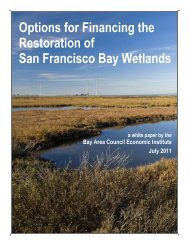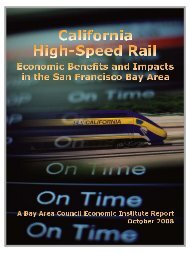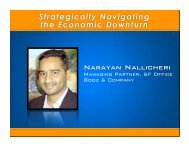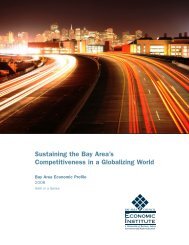Ties That Bind - Bay Area Council Economic Institute
Ties That Bind - Bay Area Council Economic Institute
Ties That Bind - Bay Area Council Economic Institute
You also want an ePaper? Increase the reach of your titles
YUMPU automatically turns print PDFs into web optimized ePapers that Google loves.
<strong>Bay</strong> <strong>Area</strong>-China Trade: Behind the Numbers<br />
Shanghai-born Sandy Calhoun, now with Squire Sanders & Dempsey in San Francisco,<br />
opened Graham & James’ offices in Japan during the 1950s, and arrived in Beijing in 1979 to<br />
help a San Francisco developer, Clement Chan, negotiate a joint venture with the Beijing International<br />
Travel Services to develop a hotel. Calhoun and a partner did not set up as consultants,<br />
but rather obtained visas as university lecturers. China had not yet reinstituted a formal legal<br />
system—criminal and civil cases were decided by the government and the Communist Party. In<br />
the absence of commercial law, contracts—and the relationship and trust between the parties<br />
behind it—precedent determined a loose legal framework for joint ventures until, of course, a<br />
dispute arose or the government intervened. At first, arbitration was permitted but had to be<br />
within China. Over time, Hong Kong and Sweden were allowed as arbitration venues. More recently,<br />
the arbitration venue is left to negotiation by the contracting parties.<br />
Keeping a Lid on Foreign Lawyers<br />
WTO compliance has eased restrictions on foreign law firms in terms of establishing a mainland<br />
China presence, but constraints remain. Foreign firms are limited in the number of offices they<br />
may open and the cities in which they may operate, with a required waiting period to open a<br />
new location.<br />
Foreign attorneys officially practice the laws of their home countries only. They may not represent<br />
clients in Chinese courts or render opinions on Chinese law, nor are they permitted to take<br />
the Chinese bar exam. Chinese lawyers may not join foreign law firms without first surrendering<br />
their Chinese law licenses. Representatives of foreign law firms in China must be attorneys in<br />
good standing with at least three years’ practice experience in their home countries. Chief<br />
representatives must spend at least 180 days of the year in China, bringing them under Chinese<br />
tax jurisdiction.<br />
Law firms initially followed their Western corporate clients into the China market, acting as advisors<br />
on trade and customs issues, contract preparation, intellectual property protection, and formation<br />
of joint ventures. Since China’s admission to the WTO, however, the market for investment-related<br />
legal services has expanded dramatically to include establishment of wholly foreignowned<br />
enterprises (WFOEs), merger and acquisition transactions and related due diligence; real<br />
estate development transactions; and preparing state-owned and private companies for initial<br />
public offerings.<br />
A Different Cultural Landscape<br />
Lawyers are reluctant to talk about specific China cases or clients, but they are willing to share<br />
insights about the overall landscape in which they operate. San Francisco attorney Bruce Quan<br />
has been advising clients doing business in China since 1985. He divides his time among the <strong>Bay</strong><br />
<strong>Area</strong>, Beijing and Shanghai and is both an associate professor of law at Beijing University and an<br />
adjunct professor of law at Hastings College of Law in San Francisco, teaching Chinese law and<br />
legal culture. Since the 1980s he has organized numerous professional exchanges of lawyers and<br />
67








